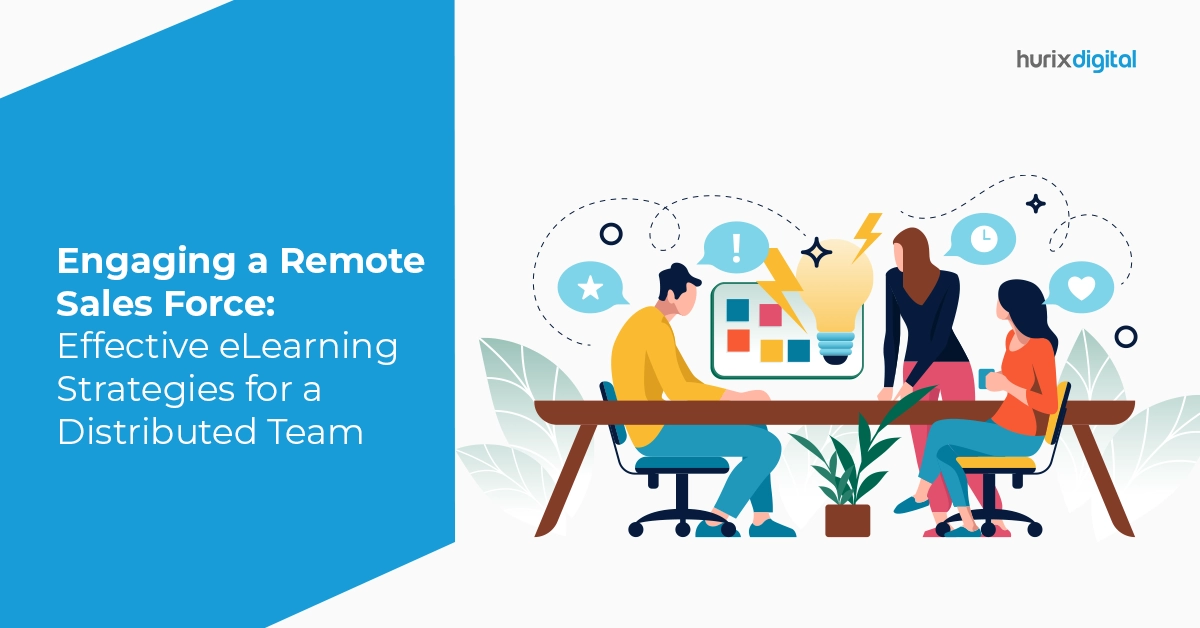
Engaging a Remote Sales Force: Effective eLearning Strategies for a Distributed Team
Summary
Learn effective eLearning strategies for training a remote sales force. This article offers tips for creating engaging online training that supports distributed sales teams.
Digital learning and training for employees have become the norm. It is no longer a luxury for organizations but a necessity, especially for companies with remote productive teams. Remote learning and training strategies to upskill your remote sales teams reign supreme. The main reasons are the cost-effectiveness, use of elevated content, a self-serve library, and collaborative learning opportunities for your salespeople.
With the advent of technologically advanced learning strategies, several companies have demonstrated enhanced revenue and productivity in sales. The focus lies in optimizing digital training strategies for remote sales teams, ensuring they have the requisite tools, skills, and knowledge to excel from any location.
Let us learn more about the key eLearning strategies for your remote sales force in this comprehensive guide!
Table of Contents
- Why Employ Sales Enablement eLearning Strategies for a Remote Sales Force?
- Main Approaches for Virtual Training Solutions for Your Remote Sales Force
- Why Sales Enablement Using Online Training for Your Remote Sales Force Matters?
- 9 Benefits of Virtual Training for Your Sales Team
- Tips to Choose the Right eLearning Strategies for Your Remote Sales Force
- Conclusion
Why Employ Sales Enablement eLearning Strategies for a Remote Sales Force?
It is not just an industry trend but a market demand to prioritize digital knowledge and skill using eLearning strategies for both employees and organizations. This shift enhances sales productivity across varied work settings.
Recent research highlights insight, agility, talent, and technology as pivotal factors that drive revenue growth in sales. Top-performing organizations focus on mastering digital training solutions for remote learning in the evolving sales landscape.
Let us look at some facts here:
- The Work Institute reports that the cost of employee turnover averages $20,000. However, the cost of reskilling is typically under $10,000.
- According to a Brandon-Hall Study, eLearning typically requires 40% to 60% less employee time than traditional classroom learning.
- The Research Institute of America found that remote learning can increase retention rates by 25% to 60%.
- Additionally, IBM discovered that employees learn nearly five times more material without increasing the time spent in training.
- 42% of companies attribute an increase in revenue to eLearning, and approximately 90% of companies offer some form of digital learning to their employees.
Whether your sales team has shifted to remote work, you’re among the many companies facing the task of training remote teams. The success of your efforts relies on effective eLearning strategies and choosing the best platform that can address knowledge gaps.
Successful eLearning strategies and digital training will:
- Equip your team with everything they need to excel
- Encourage knowledge sharing
- Refine processes
- Achieve goals autonomously
Also Read: 8 Essential Workforce Training Expectations to Master & Surpass
Main Approaches for Virtual Training Solutions for Your Remote Sales Force
The top 3 Virtual Sales Training approaches are:
1. eLearning Strategies
Remote learning can be engaging and informative if executed effectively. You can use the best eLearning platform and facilitate sales productivity using scenario-based learning, quizzes, and interactive activities. Such platforms also help in maintaining trainee engagement and facilitating the practical application of learning.
2. Webinars
Webinars are an interactive and engaging way to encourage audience participation and showcase live examples. Running live workshops via webinars can effectively convey concepts and engage participants.
3. 1-2-1 Coaching
This technique works for advanced sales reps. You can offer personalized coaching sessions for sales, customized guidance, and support. You can focus on classroom training, video usage, blogging, or conference speaking to identify individual strengths and brush up on skill development.
Why Sales Enablement Using Online Training for Your Remote Sales Force Matters?
Onboarding your sales team means immersing them in your company’s culture. It is about building interactions with colleagues and ensuring efficient engagement with processes. Here are some reasons why sales training solutions for remote employees are important:
- This is crucial, especially in a hybrid work environment, as it gets a salesperson up to speed. The representatives will be trained and coached throughout the ramp-up period, not just during initial onboarding.
- Even though your remote team may possess top-tier sales capabilities, there are still essential aspects you need to teach them.
- While they may excel at generating leads and closing sales, you may still need to deliver virtual training solutions. This will help them get familiar with your product, mission, and processes.
- When designing a training program for your remote sales team, you must equip them with the tools they need to achieve optimal results.
9 Benefits of Virtual Training for Your Sales Team
Employing vital eLearning strategies for your remote sales force has several advantages. Let us look into them:
1. Easy Pace of Working
Virtual sales training accommodates various learning styles. It offers flexibility and customization options that are tailor-made to individual preferences. Digital training can easily integrate multimedia elements that benefit visual and auditory learners. Even kinesthetic learners can thrive in a virtual setting, as they can control their pace and take breaks as needed to suit their learning style.
2. Collaborative and Engaging Learning
Virtual training encourages a collaborative atmosphere. It combines digital learning features with material delivery and allows participants to engage in missions, field activities, and discussions with peers and coaches.
Gamified activities further enhance engagement and promote interactive learning experiences. Additionally, asynchronous technology enables individuals to brainstorm ideas without being restricted by time or location.
3. In-Depth Exploration of Sales-Related Subjects
Virtual sales training offers a more thorough learning experience by allowing learners to delve deeper into essential sales-related topics. It enhances in-depth exploration and enables trainees to work through exercises and assessments multiple times. This enhances their understanding and retention of the subject matter.
4. Cost-Effectiveness of Virtual Sales Training
Virtual sales training is indisputably more cost-effective than live training. By transitioning training online, the need for live instructors diminishes. This eliminates associated travel, lodging, and printing costs. Additionally, there’s no requirement for reserving physical spaces, reducing overhead expenses.
5. Built-in Flexibility
Online training platforms can accommodate various delivery configurations, ensuring training meets diverse needs. Virtual training offers flexibility in device compatibility, accessibility, time zone independence, self-guided pacing, and individual or group participation, enhancing overall engagement and adoption.
6. Self-Paced Assignments
In live settings, limited time and dominant personalities may hinder equal participation and effective instruction delivery. Virtual training eliminates these barriers, ensuring each trainee receives personalized instruction and assessment, enhancing learning outcomes and performance improvement.
7. Optimal Examples for Effective Learning
By employing various role-playing scenarios, participants can engage in activities and examples that help them to precisely address the challenges and solutions. Trainers can use video examples, ensuring they resonate with their teams, and refine training materials over time, continually enhancing their quality.
8. Continuous Learning and Coaching for Sustainable Success
Sales productivity training shouldn’t be a one-time event but an ongoing process. This is essential for continuous support and skill development. Managers play a crucial role in this, as they can cover gaps in the training of virtual sales teams and the challenges faced by hybrid sales teams.
9. Ease of Revisiting Virtual Sales Training
Virtual sales training offers a wealth of resources even after completion. It enhances its return on investment as trainees can revisit training materials to refresh their knowledge whenever needed. Sales managers can review assessment data and performance metrics to identify areas for improvement. This helps them determine if team members require additional training.
Tips to Choose the Right eLearning Strategies for Your Remote Sales Force
Here are some tips that will help employers and organizations to choose the best eLearning strategies:
1. Understand the Needs of Your Remote Sales Teams
Before developing online learning content, gain insights into the specific needs and challenges of your remote sales teams. Conduct surveys or interviews to understand their training requirements and potential obstacles in a remote setting.
2. Set Clear Learning Objectives
Define clear and measurable learning objectives aligned with your sales team’s goals. These objectives guide the development of eLearning content, ensuring it remains focused and relevant to the learners’ needs.
3. Craft Engaging and Interactive Content for Remote Sales Teams
Design interactive and multimedia-rich eLearning content to captivate and inspire remote sales teams. Immersive content boosts knowledge retention and encourages practical application.
4. Offer On-Demand Access to Learning Resources
Take advantage of eLearning’s flexibility by providing remote sales teams with instant access to learning materials. Ensure your online learning platform allows team members to access training resources whenever and wherever they require it.
5. Encourage Collaboration and Interaction
Promote collaboration and interaction among remote sales team members and facilitate peer-to-peer learning. This will help enhance engagement and strengthen a strong sense of community.
6. Provide Ongoing Feedback and Assessments
Implement regular assessments and offer timely feedback to remote sales teams. This enables them to track their progress, identify areas for improvement, and receive guidance from trainers or mentors.
Check out EXCLUSIVE: Hurix Mini-Book: Effective Training Techniques For Enterprises With Distributed Workforce
Conclusion
Hybrid work environments have necessitated a transformation in how businesses train their remote sales force teams. In today’s fast-paced business climate, the sales cycle has grown significantly, which means you must be able to adapt to any sales situation swiftly.
Thus, it is crucial to invest in an agile hybrid salesforce eLearning strategies and training programs to prepare blended sales teams for the evolving landscape of digital selling.
Choose a customized sales eLearning platform like Hurix Digital that can address the urgent need to rapidly prepare hybrid sales teams. This platform offers a range of features, including easy course creation, support for both in-person and virtual learning, tools for practical assessments, comprehensive knowledge base creation for remote, hybrid, and in-person teams, multimedia support, and document storage and sharing capabilities.
Contact the experts at Hurix Digital now!

Performance, Results, Growth, and Life-Long Learning define my professional life. I am passionate about making workplace learning planful, purposeful, and impactful. I take pride in partnering with clients and bringing them the best in learning design and creating solutions that address business challenges.







